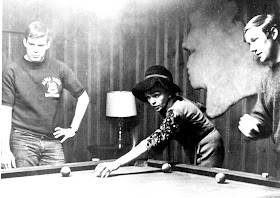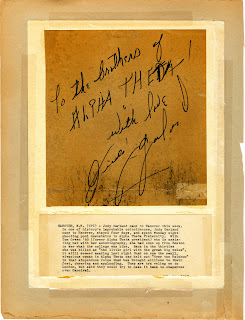 Judy Garland, the iconic singer and entertainer, playing pool in a frat basement at Dartmouth?? Who knew?? Well, the Alpha Theta scrapbook in Rauner Library contains photos and news clippings and a note signed by Miss Garland to the brothers. She came in January of 1967 and spent four days in Hanover, accompanied by Tom Green, class of '60, former president of Alpha Theta and assistant editor of the Daily Dartmouth, who had been working with Miss Garland on her autobiography. Shortly after their visit to Hanover, Miss Garland announced that she was engaged to marry Mr. Green (he would have been husband number five). They planned to marry at Dartmouth and then honeymoon in Europe. The magic that Hanover worked on Miss Garland did not last and the marriage never took place. We would surely love to hear Mr. Green’s description of their visit but alas, he is no longer with us. We must settle for the account found in the Daily Dartmouth (January 11, 1967).
Judy Garland, the iconic singer and entertainer, playing pool in a frat basement at Dartmouth?? Who knew?? Well, the Alpha Theta scrapbook in Rauner Library contains photos and news clippings and a note signed by Miss Garland to the brothers. She came in January of 1967 and spent four days in Hanover, accompanied by Tom Green, class of '60, former president of Alpha Theta and assistant editor of the Daily Dartmouth, who had been working with Miss Garland on her autobiography. Shortly after their visit to Hanover, Miss Garland announced that she was engaged to marry Mr. Green (he would have been husband number five). They planned to marry at Dartmouth and then honeymoon in Europe. The magic that Hanover worked on Miss Garland did not last and the marriage never took place. We would surely love to hear Mr. Green’s description of their visit but alas, he is no longer with us. We must settle for the account found in the Daily Dartmouth (January 11, 1967).To view the clippings and photos, ask to see the Alpha Theta scrapbook, DO-77, Box 6620.

